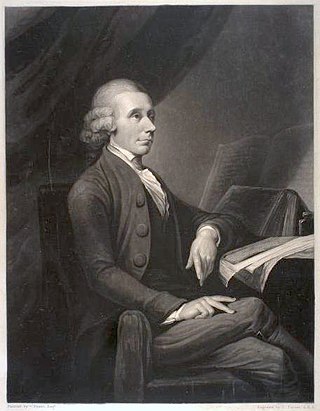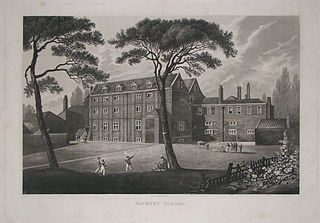Related Research Articles

Edward Arden was an English nobleman and head of the Arden family, who became a Catholic martyr.

The Theological Repository was a periodical founded and edited from 1769 to 1771 by the eighteenth-century British polymath Joseph Priestley. Although ostensibly committed to the open and rational inquiry of theological questions, the journal became a mouthpiece for Dissenting, particularly Unitarian and Arian, doctrines.

The British Critic: A New Review was a quarterly publication, established in 1793 as a conservative and high-church review journal riding the tide of British reaction against the French Revolution. The headquarters was in London. The journal ended publication in 1843.

John Conder D.D. was an Independent minister at Cambridge who later became President of the Independent College, Homerton in the parish of Hackney near London. John Conder was the theological tutor at Plaisterers' Hall Academy in 1754; and residential tutor and theological tutor at Mile End Academy, then the theological tutor at Homerton Academy.
Matthew Nicholas (1594–1661) was an English Dean of St. Paul's Cathedral, London.
Charles Croke was an English clergyman and Gresham Professor of Rhetoric.
The Socinian controversy in the Church of England was a theological argument on christology carried out by English theologians for around a decade from 1687. Positions that had remained largely dormant since the death in 1662 of John Biddle, an early Unitarian, were revived and discussed, in pamphlet literature.
The Society for Promoting the Knowledge of the Scriptures was a group founded in 1783 in London, with a definite but rather constrained plan for Biblical interpretation. While in practical terms it was mainly concerned with promoting Unitarian views, it was broadly based.

The Octagon Chapel, Liverpool, was a nonconformist church in Liverpool, England, opened in 1763. It was founded by local congregations, those of Benn's Garden and Kaye Street chapels. The aim was to use a non-sectarian liturgy; Thomas Bentley was a major figure in founding the chapel, and had a hand in the liturgy.

The Convocation of 1563 was a significant gathering of English and Welsh clerics that consolidated the Elizabethan religious settlement, and brought the Thirty-Nine Articles close to their final form. It was, more accurately, the Convocation of 1562/3 of the province of Canterbury, beginning in January 1562.
Edward William Grinfield (1785–1864) was an English biblical scholar.

Newcome's School was a fashionable boys' school in Hackney, then to the east of London, founded in the early 18th century. A number of prominent Whig families sent their sons there. The school closed in 1815, and the buildings were gutted in 1820. In 1825 the London Orphan Asylum opened on the site. Today the Clapton Girls' Academy is located here.
The Lieutenant of the Duchy of Aquitaine was an officer charged with governing the Duchy of Aquitaine on behalf of the King of England. Unlike the seneschalcy of Gascony, the lieutenancy was not a permanent office. Lieutenants were appointed in times of emergency, due either to an external threat or internal unrest. The lieutenant had quasi-viceregal authority and so was usually a man of high rank, usually English and often of the royal family.
The Phytologist was a British botanical journal, appearing first as Phytologist: a popular botanical miscellany. It was founded in 1841 as a monthly, edited by George Luxford. Luxford died in 1854, and the title was taken over by Alexander Irvine and William Pamplin, who ran it to 1863 with subtitle "a botanical journal".
References
- 1 2 Machin, Ian. "Massie, John". Oxford Dictionary of National Biography (online ed.). Oxford University Press. doi:10.1093/ref:odnb/58254.(Subscription or UK public library membership required.)
- ↑ . Dictionary of National Biography . London: Smith, Elder & Co. 1885–1900.
- ↑ . Dictionary of National Biography . London: Smith, Elder & Co. 1885–1900.
- ↑ Jones, R. Tudur. "Dale, Robert William". Oxford Dictionary of National Biography (online ed.). Oxford University Press. doi:10.1093/ref:odnb/7015.(Subscription or UK public library membership required.)
- ↑ Jones, R. Tudur. "Raleigh, Alexander". Oxford Dictionary of National Biography (online ed.). Oxford University Press. doi:10.1093/ref:odnb/23041.(Subscription or UK public library membership required.)
- ↑ . Dictionary of National Biography . London: Smith, Elder & Co. 1885–1900.
- ↑ "The city of Cambridge - Theological colleges | A History of the County of Cambridge and the Isle of Ely: Volume 3 (pp. 139-141)". British-history.ac.uk. 22 June 2003. Retrieved 2 September 2012.
- ↑ Aaron Crossley Hobart Seymour (1839). The Life and Times of Selina, Countess of Huntingdon. William Edward Painter. p. 536 . Retrieved 19 December 2012.
- ↑ W. J. Mander, Alan P. F. Sell, Gavin Budge (editors), The Dictionary of Nineteenth-century British Philosophers, Volume 2 (2002), p. 1045.
- ↑ . Dictionary of National Biography . London: Smith, Elder & Co. 1885–1900.
- ↑ . Dictionary of National Biography . London: Smith, Elder & Co. 1885–1900.
- ↑ Stowell is in the DNB.
- ↑ Reynolds is in the DNB.
- ↑ "Hackney - Protestant Nonconformity | A History of the County of Middlesex: Volume 10 (pp. 130-144)". British-history.ac.uk. Retrieved 2 September 2012.
- ↑ T.F.T. Baker, ed. (1995). "Hackney: Education". A History of the County of Middlesex: Volume 10: Hackney. Institute of Historical Research. Retrieved 30 October 2012.
- 1 2 . Dictionary of National Biography . London: Smith, Elder & Co. 1885–1900.
- ↑ Surman Index: Idle Academy Archived 2011-08-30 at the Wayback Machine
- ↑ . Dictionary of National Biography . London: Smith, Elder & Co. 1885–1900.
- ↑ Lee, Sidney, ed. (1912). . Dictionary of National Biography (2nd supplement). Vol. 2. London: Smith, Elder & Co.
- ↑ Surman Index: New College, London Archived 2011-08-30 at the Wayback Machine
- ↑ Halley is in the DNB.
- ↑ Tudur Jones, R. "Parker, Joseph". Oxford Dictionary of National Biography (online ed.). Oxford University Press. doi:10.1093/ref:odnb/35386.(Subscription or UK public library membership required.)
- ↑ Lee, Sidney, ed. (1912). . Dictionary of National Biography (2nd supplement). Vol. 3. London: Smith, Elder & Co.
- ↑ "Paton Congregational College, Nottingham - The University of Nottingham" . Retrieved 8 July 2014.
- ↑ . Dictionary of National Biography . London: Smith, Elder & Co. 1885–1900.
- ↑ Matthew, H. C. G. "Byrth, Thomas". Oxford Dictionary of National Biography (online ed.). Oxford University Press. doi:10.1093/ref:odnb/4284.(Subscription or UK public library membership required.)
- ↑ Morgan, Basil. "Thom, John Nichols". Oxford Dictionary of National Biography (online ed.). Oxford University Press. doi:10.1093/ref:odnb/27504.(Subscription or UK public library membership required.)
- ↑ rotherhamweb.co.uk/, Rotherham Independent Academy.
- ↑ Alan P. F. Sell (2004). Philosophy, Dissent and Nonconformity. James Clarke & Co. p. 46. ISBN 978-0-227-67977-7.
- ↑ Clipsham, E. F. "Booth, Abraham". Oxford Dictionary of National Biography (online ed.). Oxford University Press. doi:10.1093/ref:odnb/2871.(Subscription or UK public library membership required.)